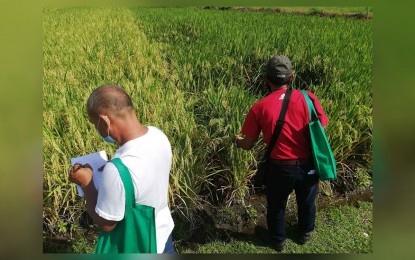
ENHANCING FARMERS' KNOWLEDGE. Participants check on the varieties of rice during the "Lakbay Palay" event of the Philippine Rice Research Institute (PhilRice) in Ligao City. At least 370 Bicolano farmers attended the "Bukid Tipid Tips, Subukan" on Tuesday (Oct. 11, 2022). (PNA photo by Connie Calipay)
LIGAO CITY – At least 370 Bicol farmers learned new information and techniques that will help them equip and prepare for their rice farming strategies with the start of the wet season during the "Lakbay Palay" event on Tuesday at the Philippine Rice Research Institute (PhilRice) compound here with the theme "Bukid Tipid Tips,Subukan"!
Dr. Victoria C. Lapitan, PhilRice Bicol director, in an interview, said the "Lakbay Palay' aims to showcase to the farmers different rice varieties that can be used to adapt in their farms and technologies that would increase their rice yield while reducing production costs.
"We also invited experts for inbred and hybrid rice varieties and characteristics, abonong swak, (and) pest management, to discuss information and techniques that can be used by the participants," she said.
Sazy A. Lactao, of Lapafara Irrigators Association Inc., Barangay Lahong Bulan in Sorsogon, in an interview, said the training is necessary for additional knowledge on what to use that would be beneficial to their ricefields.
"As an officer in our organization, I can teach my members how to manage their rice fields based on what I've learned here. I also encouraged my co-members to adapt the new technologies, particularly machinery that will help make our work easier," he said.
Meanwhile, Lapitan said as Catanduanes is one of the seven pilot provinces selected in the country to become priority areas for the golden rice program, farmers were able to reproduce golden rice seedlings.
She said they plan to buy back the seeds for the next season and distribute these to the intended beneficiaries and seed growers who will produce more seeds.
Lapitan said they will also conduct a feeding program using golden rice in Catanduanes by November coinciding with National Rice Awareness Month.
PhilRice said when consumed as part of the daily diet, golden rice can give young children 30-50 percent of their estimated Vitamin A average requirement.
The addition of beta-carotene in its grains is intended to address Vitamin A deficiency that can lead to a weak immune system, impaired cognitive development, and poor eyesight.
Lapitan assured the public that golden rice is as safe for human consumption as ordinary rice with the added benefit of beta-carotene in the grains. (PNA)
